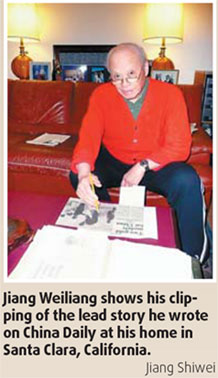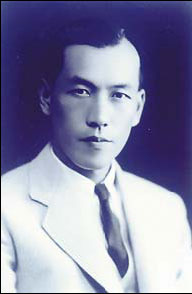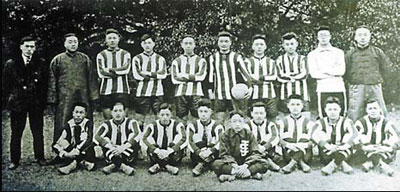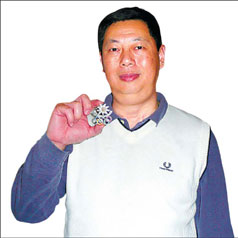The other relay
|
The gold medals of the 10th, 11th and 26th Olympic Games exhibited by Jiang Shiwei in Shanghai. Photos by Jiang Shiwei |
Shanghai: For 50-year-old Jiang Shiwei and his family, the Beijing Olympics torch relay, now on across the world, carries a special meaning. It parallels a family relay spanning at least 76 years.
Jiang's granduncle, Zu-Liang Sung (1897-1967), headed the Chinese delegation to the 10th Olympic Games in Los Angeles in 1932 and the 11th Games in Berlin in 1936.
His father, Jiang Weiliang, covered the 23rd Olympics Games in Los Angeles in 1984 as a journalist for China Daily. It was the first time the People's Republic of China sent a team to the Olympics.
|
Zu-Liang Sung.File Photo |
And for the past 20 and more years, Jiang Shiwei has been searching and collecting Olympic mementos from all over the world.
He will be exhibiting more than 30 of them, including many valuable historical mementos, at the Shanghai Sports Museum from April 30.
"I feel like I'm running in the Olympic torch relay even without holding the torch in my hand, and like an Olympic volunteer even without wearing the uniform," says Jiang Shiwei, a businessman who has been devoting almost all his time to things related to the Olympics craze in the past years.
China's first participation in the Olympics Games in 1932 is a bitter-sweet memory for the nation.
It was the first time that China sent an athlete to the games since the first Olympic Games convened in Athens, Greece, in 1896.
But China sent only one athlete in its six-member delegation. Sprinter Liu Changchun (1909-1983) didn't finish well in the men's 100-m, 200-m and 400-m races, after a 25-day sea journey.
Zu-Liang Sung, who was then honorary secretary general of the China National Amateur Athletic Federation, was appointed to lead the Chinese group.
A graduate of Oberlin College and Columbia University in the United States, Sung started his trip from Shanghai to Los Angeles three weeks before the other members. Even with very limited funding, he wanted to make the best arrangements for food and lodging for Liu Changchun. More importantly, he wanted to make sure that the Japanese puppet state Manchukuo in Northeast China was neither invited nor represented.
China was in a critical situation then after Japan invaded Northeast China on September 18, 1931.
The Japanese had hoped that Liu Changchun, from Northeast China's Jilin province, would represent Manchukuo. But this demand was declined instantly by Liu.
|
Zu-Liang Sung (left) with St John's University's football team. ile Photo |
The national chaos had also dashed Sung's hope of sending a national soccer team to the Olympics.
China didn't win any medal at its first official Olympic debut in the 1932 games, but the rest of the world still got to know China better through Sung's speech at a meeting on recreational activities, as part of the program for the 10th Games.
To Sung, just being at an Olympic Games signaled a huge victory.
His vivid description of wushu, or martial arts, intrigues the officials attending the Games.
In fact, when the Chinese delegation to the 1936 Berlin Games set sail from Shanghai, it included 11 exponents of traditional martial arts. The whole delegation of 139 members included 69 athletes. It was a huge jump from the one athlete in 1932.
China again missed out on a medal at the Berlin Games. However, the martial arts performers dazzled audiences during their tours in Europe.
Back home in Shanghai, Sung, continued to push forward national sports campaigns as head of the China National Amateur Athletic Federation. He firmly believed that sports would help the country.
|
Jiang Shiwei holding an Olympic memento in his Shanghai home. Shi Jimin |
Shanghai's prestigious St John's University, where Sung worked as its provost and sports division chief, nurtured some of the greatest athletes and sports teams in China from the 1920s to the 1940s.
As early as 1927, Sung, an accomplished soccer player and track-and-field athlete, joined Chenting Wong and Chang Po-ling, two prominent national athletic sponsors, to organize the 8th Far Easten Games in Shanghai.
Sung was appointed the first Chinese president of St John's University from 1941-45, and helped run the school smoothly at a challenging time when the country was under Japanese occupation. St John's groomed many graduates who later become leaders in their fields.
Sung moved to the United States in 1949 and died in Berkeley, California, in 1967 at the age 70.
"In his youth, my granduncle often talked about his Olympic dreams - when China can attend the Olympics, when China can send a team, when China can win a gold medal and when China can host an Olympic Games," says Jiang Shiwei, quoting stories told by family members and relatives.
Sung's first two dreams came true under his own watch in 1932 and 1936.
But his third dream was not realized until 1984 when the People's Republic of China sent its first delegation with 225 athletes to Los Angeles.
This time, his nephew, Jiang Weiliang, head of the sports department of China Daily, was there to witness the historic moment.
Jiang Shiwei still remembers how thrilled his father was back in 1984 announcing the news to the whole family.
"I will go to cover the 23rd Olympic Games in Los Angeles, the place my uncle visited," Jiang Weiliang said.
He was almost in tears while watching the massive Chinese delegation marching into the Los Angeles coliseum.

"Fifty-two years earlier my uncle was kind of lonely in this city leading only one athlete. Fifty-two years later, I felt so proud to see a prosperous China returning to the Olympics," says Jiang Weiliang.
He has kept the clipping of the lead story he wrote on China Daily when Chinese sharpshooter Xu Haifeng won the first gold medal for China. It was also the first gold medal of the 23rd Olympic Games.
"My uncle's third dream was also realized," says Jiang Weiliang, also a graduate of St John's University and an excellent swimmer and baseball player in his youth. He now lives in Santa Clara, California.
"My father always thinks covering the 23rd Olympic Games was the most memorable moment in his life," says Jiang Shiwei, who returned last month after another fruitful search for Olympic memorabilia in the United States.
Just hours after landing in Shanghai, he found himself being chased by journalists, who were eager to get a look at the tickets, medals and roster of the 1932 Olympic Games and other precious items.
"There is enormous interest in anything Olympic," Jiang Shiwei says. In fact, he himself talks like an expert on Olympic history, quoting Pierre de Coubertin, founder of the modern sports movement, and other sports anecdotes.
Like his granduncle and father, Jiang Shiwei has also inherited a great love of sports. He is not just a good swimmer and baseball player, but also a certified baseball referee.
"I still need to work hard to catch up with my granduncle and father," Jiang Shiwei says. "But I am so excited that my granduncle's fourth and last dream will come true when Beijing hosts the Olympics in August."
(China Daily 04/24/2008 page20)


















